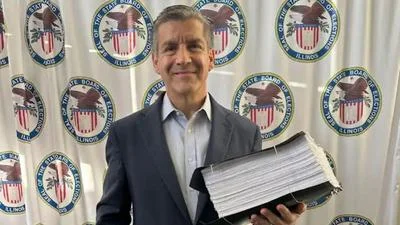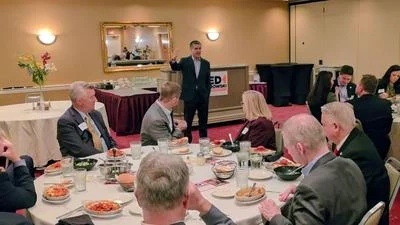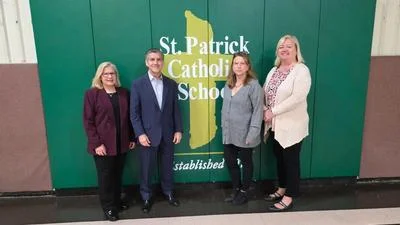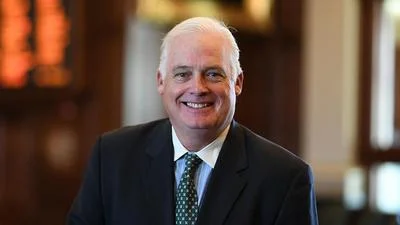Edgar County Watchdogs principals sought to provide a basic understanding of Illinois’ legal repository. | Contributed photo
Edgar County Watchdogs principals sought to provide a basic understanding of Illinois’ legal repository. | Contributed photo
Reckoning that “for every article we publish, there are at least five more” potential stories delving into government issues, Edgar County Watchdogs (ECW) recently recapped what it considered some of Illinois’ most salient legal woes.
Apprising constituents of the state’s administrative fabric via its “Illinois Leaks” website, ECW principals sought to provide a basic understanding of Illinois’ legal repository, acknowledging that while no one can maintain full knowledge of the vast amount of information, “part of citizen engagement is to keep a close eye on the actions of our elected officials."
The watchdog group selected four examples of government corruption as a sampler. Starting with LaSalle County, ECW recapped how that county’s state’s attorney — Brian Towne — rationalized his behavior retroactively. Towne had taken seized drug money and spent it illegally in May 2016, according to ECW.
Following media exposure, a law was passed that rendered the action legal after the fact; Towne interpreted that as tacit approval, crowing that the legislation was “a clarification and reassurance that what I was criticized for doing was fine all along,” the watchdog group quoted him as saying — and then took issue with Towne’s perception and belief that his actions were vindicated.
“No, the passage of new legislation proved that what you were doing was in violation of the law and you had it changed to provide cover from potential prosecution,” principals said via the website. “Had it been fine all along, there would have been no need for legislation.”
The Watchdogs’ second example also related to legislation that sought to protect its very violators; DuPage County’s Election Commission deviated from regulations for filing ballot measures on time just last month. When called out for it, legislators — “literally at the last waking hour of the 99th General Assembly,” said ECW, passed a bill that Gov. Bruce Rauner subsequently signed in mid-February making it illegal only for that one instance and not applicable for future mistakes. ECW pronounced it wholly unconstitutional.
Thirdly — again, in DuPage County — the DuPage Township was discovered to be using government vehicles to make private mulch deliveries to residents. ECW approached the parties involved, noting “great resistance” until, coincidentally, their association and attorneys confirmed the illegality — then observed as DuPage lawmakers actually created a brand-new law in a mind-boggling “attempt to legalize what is not legal right now,” said the group.
“The government has no business competing with … local businesses,” ECW said, adding that the fact the law is being crafted is testament to officials’ awareness that it simply is not legal and urging constituents to contact bill sponsors with concerns.
Finally, the Watchdogs targeted a regulation entitled the Local Government Debt Limitation Act (LGDLA). Specifically relating the measure, but not necessarily limiting its ramifications to, the Lincoln-Way School District 210 suggesting that the title implies what it says. The organization said residents will quickly “see the twilight zone we are living in” and suggested that readers refrain from sipping any beverages before attempting to grasp the logic in the law.
“Remove all liquids from your mouth before reading further,” ECW warned citizens before quoting directly from the statute: “the limitation … shall not apply to any indebtedness of any school district for acquiring or improving a site or sites, constructing, extending, improving and equipping school buildings or establishing a working cash fund.”
In other words, said the Watchdogs, the schools are excused from their own limits with “special carve outs,” as ECW dubbed the plentiful exceptions. Whether the logic behind this manipulation or its consequences — allowing school districts to spiral ever deeper into the red — is worse, is practically moot. Both the rationalization and its results are dire enough, according to ECW.
The salt in the wound for this last shenanigan is that within the LGDLA, there is actually a phrase that ECW interprets to mean “the debt they have is not considered indebtedness for the purpose of any debt limitation. ‘The debt incurred on any bonds issued under this subsection shall not be considered indebtedness for purposes of any statutory debt limitation,’” it stated, quoting the statute.
“Debt is debt and hiding it this way does nothing towards fixing the financial mess this state is in,” ECW concluded.






 Alerts Sign-up
Alerts Sign-up